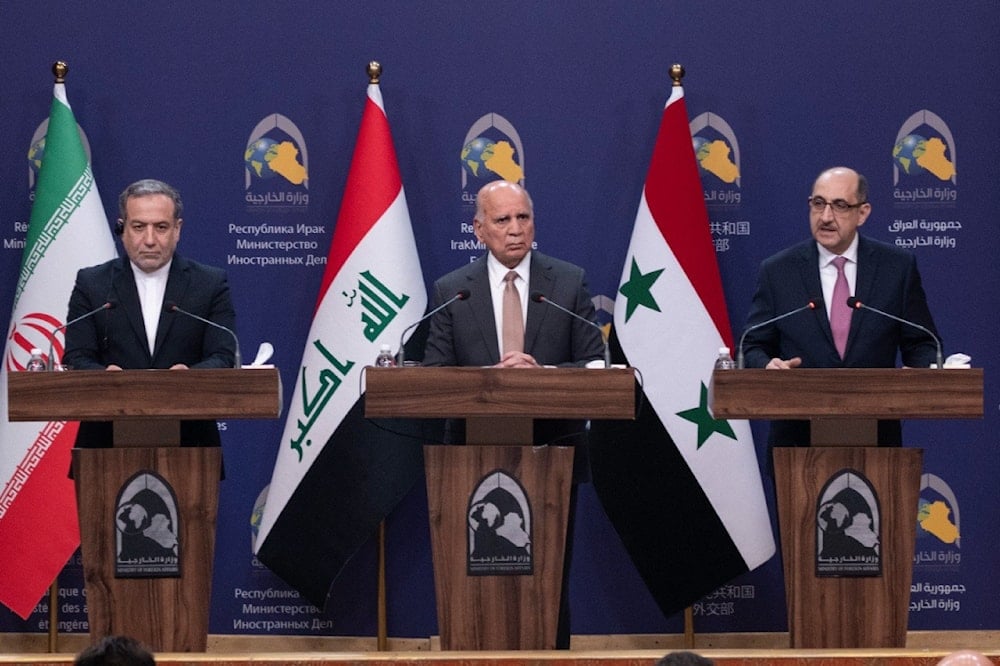Protecting Syria preserves regional security: Syria, Iraq, Iran summit
A joint press conference, featuring Syria, Iraq, and Iran, stresses the need to confront armed groups in Syria to protect regional stability.
-

Iraqi Foreign Minister Fouad Hussein, center, Iranian Foreign Minister Abbas Araghchi, left, and Syrian Foreign Minister Bassam Sabbagh, right, hold a press conference in Baghdad, Iraq, Dec. 6, 2024. (AP)
Syria, Iran, and Iraq, represented by their foreign ministers, held a press conference in Baghdad, following a scheduled tripartite meeting, primarily to discuss the recent crisis in Syria.
Iraqi Foreign Minister Fuad Hussein announced that Iraq plans to summon a number of countries to discuss the Syrian conflict, affirming that efforts with his Iranian and Syrian counterparts continue to organize and cooperate on diplomatic initiatives regarding the matter.
The presser also saw Hussein announcing that Iraq would call for a League of Arab States ministerial meeting, declaring that all diplomatic efforts would be activated to resolve the Syrian crisis.
The Turkish, Saudi, Jordanian, Emirati, and Egyptian foreign ministers were also contacted, according to Hussein, to reach compromises with these countries' representatives, some of whom are members of the Astana process.
Regarding the Iranian and Syrian foreign ministers' visit to Baghdad, the Iraqi top diplomat revealed that the dangerous security situation in Syria was thoroughly discussed, alongside its regional implications, primarily on Iraq.
"Iraq and Syria's security are interlinked, and their security is also linked to those in their neighboring countries," Hussein also stated, reaffirming Iraq's commitment to "protect its borders and push terrorist attacks away from its territories," condemning, once again, the armed groups' attacks on Syrian cities and provinces.
'Exposed and transparent' plots: Syria
For his part, Bassam al-Sabbagh, Syria's foreign minister, outlined the aspects of regional and international intervention in what is happening in Syria, stressing that they are "exposed and transparent," and further warned that they aim to create a new division in the region and redraw its political map."
During the joint press conference, al-Sabbagh noted that "the parties carrying out the terrorist attack are violating relevant United Nations and Security Council resolutions," adding that the developments and security threats in Syria have been extensively explained, "especially since the terrorist attack has caused a large wave of displacement."
'Israel' involved in attacks on Syria: Iran
Meanwhile, Iranian Foreign Minister Abbass Araghchi confirmed that the primary objective of the meeting was to "support Syria, its government and people, in confronting terrorist groups."
Araghchi expanded, saying the meeting aimed at reiterating that threats of armed groups would not be confined to Syria, but would impact all countries in the region. "If we want to protect our security, we must defend the security of neighboring countries and help confront the phenomenon of terrorism," he declared.
He also stressed that there was no such thing as "good terrorism or bad terrorism," adding that the international coalition should not differentiate between those groups, calling for joint efforts to combat them. Urging the international community to support these efforts, Araghchi reiterated Iran's support for Iraq's diplomatic endeavors to achieve calm and stability in the region.
The Iranian foreign minister confirmed that Tehran has always unconditionally supported Syria and will continue to do so, adding that it would aid Syria with all that it needs and requests, stressing that "those who want to dismiss the role of the Zionist entity in the attacks on Syria are mistaken."
Read more: We are fighting a common enemy in Syria: Armed groups to Israeli media

 3 Min Read
3 Min Read








